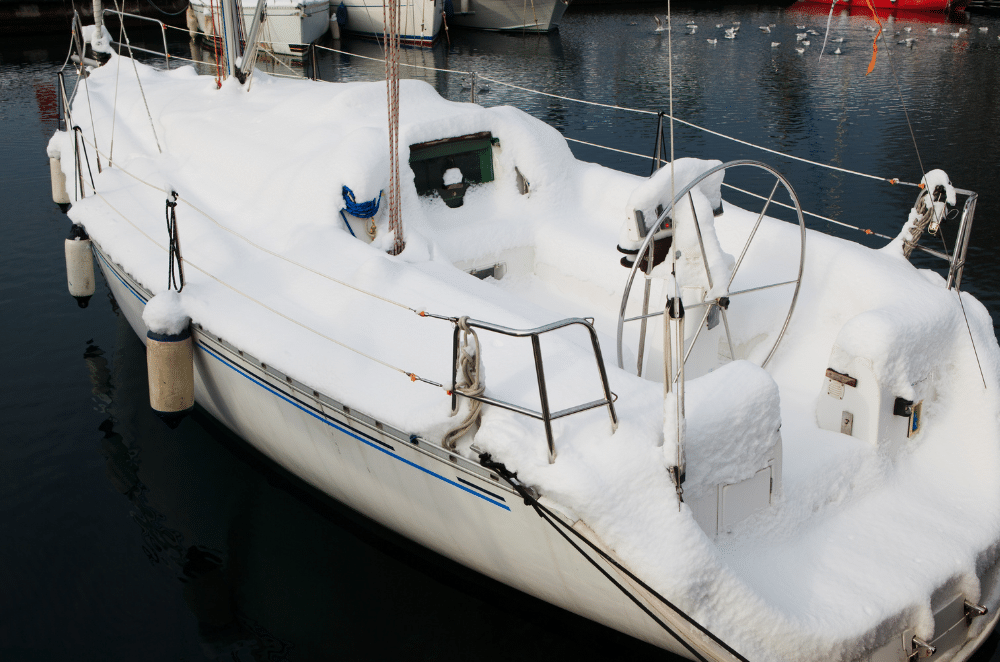
In South Carolina, with our relatively mild winters, many boat owners question the necessity of winterizing their vessels. The region’s coastal charm invites year-round boating, but periodic cold snaps can be deceptive.
While the Palmetto State doesn’t experience the harshest winter conditions, winterizing your boat can keep it in good condition. This extends the lifespan of your vessel and helps prevent malfunctions or accidents when you take it out on the water again in the warmer months.
Should You Winterize Your Boat in South Carolina?
In South Carolina, winter temperatures can vary. For example, in North Charleston, temps in December and January average between about 47°F and 52°F. Weather conditions include everything from mild days and rain to snow flurries and freezes.
However, winterizing your boat isn’t just about preparing for freezing temperatures; it’s about protecting your engine and other components from condensation and potential corrosion. The state’s coastal areas also deal with high salinity and humidity, which can lead to accelerated wear and tear.
These issues make winterizing your boat in South Carolina crucial to maintaining its performance and prolonging its lifespan.
Steps for Winterizing Your Vessel
As the cooler months approach in South Carolina, ensuring your boat’s protection is crucial, whether you’re storing it ashore or leaving it in the water. Different storage methods require specific preparation steps. Here are some tailored guidelines to winterize your vessel for both scenarios:
Storing Ashore (Out of the Water)
When storing your vessel out of the water in your garage, driveway, or another area, do the following:
- Clean and dry: Before storing your boat ashore, give it a thorough cleaning. Remove any algae, barnacles, or other marine growth from the hull. Ensure the interior is clean and completely dry to prevent mold or mildew growth during storage.
- Inspect and repair: Check the boat for any damage or issues that need to be addressed, such as cracked light covers or rusted parts. It’s more cost-effective to handle repairs now than to discover them in the spring after they’ve caused a malfunction.
- Drain water systems: Empty all water systems, including the engine, freshwater system, and bilges. Any residual water left in pipes or systems can freeze and cause damage.
- Protect the engine: Change the engine oil and replace the filters. Fog the engine with a storage spray to prevent corrosion. Disconnect the battery and store it in a dry place.
- Cover the boat: Use a high-quality boat cover made of marine acrylic fabric, polyester, or polypropylene to protect your vessel from the elements. Ensure it fits snugly and provides adequate ventilation to prevent condensation.
Storing in the Water
If you plan to store your boat in the water, take the following steps to prevent damage:
- Check bilge pumps: Ensure that bilge pumps are functional. These are essential for removing water that might get into the boat during the winter months.
- Use anti-freeze: Even in milder climates, there can be cold snaps. Use non-toxic antifreeze in the engine, water systems, and bilges as a precaution.
- Inspect lines and fenders: Make sure mooring lines are in good condition and not showing signs of wear. Adjust fenders to protect against any shifts caused by winds or tides.
- Ventilate: Good ventilation is vital to prevent the growth of mold and mildew. Use ventilation methods such as solar or cowl vents to ensure no moisture gets trapped.
- Monitor regularly: Periodically check your boat during the winter, especially after storms or significant weather changes. This helps catch any issues before they become major problems.
Why Winterizing Your Boat is Essential
Winterizing your boat is a necessary step in ensuring safety and longevity. Poor maintenance can result in malfunctioning parts that cause devastating accidents. The United States Coast Guard reported machinery failure as a leading contributor to boating accidents in 2023. These failures led to 405 accidents, 18 deaths, and 105 injuries.
For example, not draining water systems during cold temperatures can lead to frozen pipes that rupture. Untreated fuel systems can result in engine failures, and corroded wires can cause safety lights to malfunction.
By winterizing, not only do you protect your vessel’s integrity, but you also safeguard against potential hazards that can happen due to maintenance neglect.
Contact Joye Law Firm if You Were a Victim in a Boating Accident
Taking the time to winterize your boat is not just about preserving its value but also ensuring the safety of all on the water. If you are injured in an accident due to another boater’s negligent maintenance or behavior, speak with a South Carolina boat injury lawyer at Joye Law Firm.
Our experienced team can guide you through the claims process, helping you receive compensation for your injuries and property damages. Contact us today to schedule a free case review so we can help you understand your legal options.






































